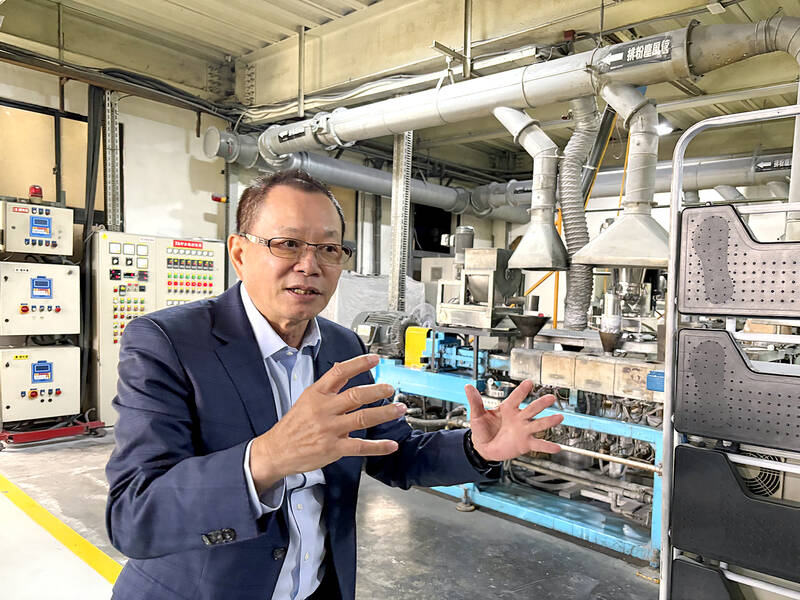Nytex Composites Co (耐特科技), which makes specialty plastic compounds, expects revenue contribution from semiconductor materials to rise to more than 23 percent this year due to growing demand for artificial intelligence (AI) and advanced chips.
That would represent a big jump from 16.25 percent of total revenue last year and a mere 4.36 percent in 2023.
The Changhua County-based company tapped into the semiconductor sector in 2020, as it sought to transform itself into a supplier of high-value materials amid intensifying market competition.

Photo: Lisa Wang, Taipei Times
Revenue expanded 19.24 percent last year to NT$2.54 billion (US$77.57 million) from NT$2.13 billion in 2023, company data showed.
Nytex’s biggest revenue sources come from specialty plastics used in everyday life goods, such as office furniture, office automation, suitcases and mechanical parts, making up about 33 percent.
“Semiconductor materials are our new revenue driver, adding to the company’s already very diversified revenue sources,” Nytex chairman Jason Chen (陳勳森) told reporters during a factory tour on Thursday, adding that he was positive about this year’s growth.
Established in 1988, Nytex started supplying specialty plastic compounds in 2020 to Gudeng Precision Industrial Co (家登精密), which at the time was scrambling to find a domestic supplier due to supply disruptions from overseas, Chen said.
Gudeng makes extreme ultraviolet pods, advanced front-opening unified pods and wafer cassettes for Taiwan Semiconductor Manufacturing Co (TSMC, 台積電), Intel Corp, Chinese and South Korean chipmakers.
Nytex has spent NT$100 million to build two production lines in Changhua County to produce specialty plastic compounds, doubling the capacity from two years ago, to cope with rapidly growing demand for semiconductor materials used in advanced wafer pods and cassettes, which transport wafers during the chip manufacturing process, it said.
“We started looking into the premium material business about six years ago, as we found that Chinese manufacturers were ready to ramp up mass production of [mid-end] materials. A majority of premium materials are for semiconductors, which was totally new to us,” Nytex president Henry Chen (陳宇涵) said.
In China, Nytex plans to ramp up its first production line in Shanghai to supply semiconductor materials used in less advanced wafer pods for Chinese chipmakers, which make chips on less advanced process technologies such as 28 nanometer technology, it said.
Nytex is also set to supply plastic compounds used in IC trays, which are used in advanced packaging technology, chip-on-wafer-on-substrate (CoWoS) technology, next quarter, Jason Chen said.
Nytex’s plastic compounds are also used in back-up battery units, which are equipped within AI servers to prevent data losses and equipment damage during power outages, it said.
The company operates six production lines to supply plastic compounds used in electronics and other products, in addition to 10 production lines in Taiwan to supply plastic compounds to make heat sinks for Wi-Fi routers, vehicle parts, connectors and bicycle parts among others.
The company plans to submit an application for an initial public offering this year.

Taiwan’s exports soared 56 percent year-on-year to an all-time high of US$64.05 billion last month, propelled by surging global demand for artificial intelligence (AI), high-performance computing and cloud service infrastructure, the Ministry of Finance said yesterday. Department of Statistics Director-General Beatrice Tsai (蔡美娜) called the figure an unexpected upside surprise, citing a wave of technology orders from overseas customers alongside the usual year-end shopping season for technology products. Growth is likely to remain strong this month, she said, projecting a 40 percent to 45 percent expansion on an annual basis. The outperformance could prompt the Directorate-General of Budget, Accounting and

The demise of the coal industry left the US’ Appalachian region in tatters, with lost jobs, spoiled water and countless kilometers of abandoned underground mines. Now entrepreneurs are eyeing the rural region with ambitious visions to rebuild its economy by converting old mines into solar power systems and data centers that could help fuel the increasing power demands of the artificial intelligence (AI) boom. One such project is underway by a non-profit team calling itself Energy DELTA (Discovery, Education, Learning and Technology Accelerator) Lab, which is looking to develop energy sources on about 26,305 hectares of old coal land in

Netflix on Friday faced fierce criticism over its blockbuster deal to acquire Warner Bros Discovery. The streaming giant is already viewed as a pariah in some Hollywood circles, largely due to its reluctance to release content in theaters and its disruption of traditional industry practices. As Netflix emerged as the likely winning bidder for Warner Bros — the studio behind Casablanca, the Harry Potter movies and Friends — Hollywood’s elite launched an aggressive campaign against the acquisition. Titanic director James Cameron called the buyout a “disaster,” while a group of prominent producers are lobbying US Congress to oppose the deal,

Two Chinese chipmakers are attracting strong retail investor demand, buoyed by industry peer Moore Threads Technology Co’s (摩爾線程) stellar debut. The retail portion of MetaX Integrated Circuits (Shanghai) Co’s (上海沐曦) upcoming initial public offering (IPO) was 2,986 times oversubscribed on Friday, according to a filing. Meanwhile, Beijing Onmicro Electronics Co (北京昂瑞微), which makes radio frequency chips, was 2,899 times oversubscribed on Friday, its filing showed. The bids coincided with Moore Threads’ trading debut, which surged 425 percent on Friday after raising 8 billion yuan (US$1.13 billion) on bets that the company could emerge as a viable local competitor to Nvidia